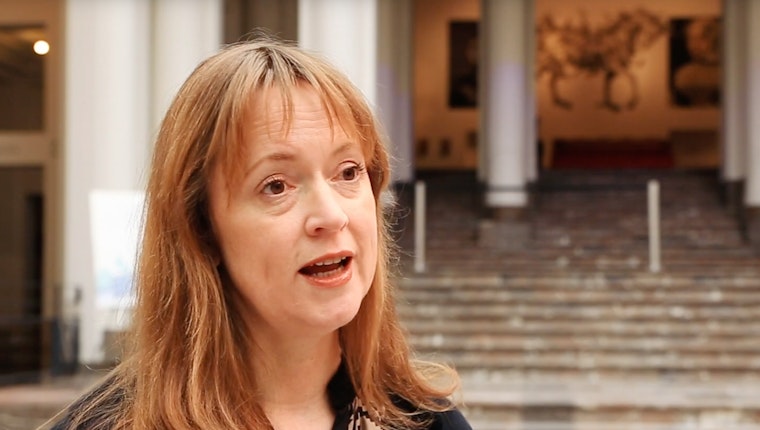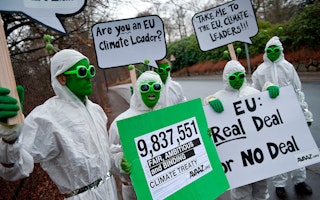Confronting the EU’s Three Biggest Challenges
By Heather Grabbe

For once, the European Union has an opportunity to connect directly to the strong, positive energy of the next generation of voters. It has the scale and resources to respond to the demands of the youth activists and other social movements for faster, more radical action to prevent catastrophic climate change. This is an inherently cross-generational issue that needs coordinated action across the whole continent, so the EU is the right level of governance to create a strategy that can survive over many changes of government.
Ursula von der Leyen, the new European Commission president, has promised a “European Green Deal” with a new law within her first 100 days. This deal will need to be comprehensive, covering not only rapid decarbonization of the economy but also protection of biodiversity and other planetary limits. It will also need to cover the interaction between climate-related measures and the massive societal disruptions that will come from digital transformation of the economy and aging populations.
These problems are much greater than most politicians are prepared to admit, threatening huge political, economic, and social disruption. Successful handling of this triple transition will require major changes to government policies, economic systems, and physical infrastructure.
In a new report, a group of innovative thinkers—brought together by the Open Society European Policy Institute and Carnegie Europe and referred to as the European Reformists—map out how much our lives will change over the next two decades and the vital role the EU could play in managing the triple transition.
It is not a question of whether to address these challenges, but how—and whether Europeans cope badly or well. The European Reformists argue that the EU has unique resources to manage the disruptive effects.
The EU can act at the scale of half a billion people and has a common budget. It has a community of law to make agreements stick even when governments change. It has the power to set global norms, thanks to its market size and coherence. And it has open societies where people can exchange ideas, innovate, and use the benefits of diversity to find new solutions.
On climate, the EU should set out ambitious plans to discourage wasteful overconsumption, which fuels climate change and environmental degradation. A combination of tax reform and tighter technical standards to prevent premature obsolescence would be the right start. It is vital that the EU gets the sequencing of the measures right to ensure that the transition to low and then no carbon will be fair, with economic and social justice objectives built in from the start. That is the only way to make what could be a decades-long transition politically sustainable.
At the same time, the EU has to act internationally as the only global power left that could provide leadership on the shift to a low-carbon, sustainable economy to protect future generations. The EU has a much better chance than either the United States or China to bring climate justice together with social justice, making sure that the inevitable transitional costs don’t fall mainly on consumers and households, and that there is social protection for the poor and vulnerable.
That is the best way to respond to protests like the gilets jaunes: to match higher taxes on fuel with reductions on payroll taxes, and to start by taxing corporate jets rather than tractor fuel. The EU could coordinate investment of public money in the important, labor-intensive upgrading of infrastructure and housing to use less energy. Public investment in green jobs would give two forms of security at once, as well as a more equitable and lower carbon way of stimulating the economy than cheap money to banks.
The second big transnational challenge is digital. The EU needs to introduce financial penalties for operators of critical infrastructure who fail to observe high security standards, and introduce mandatory labelling of networked equipment, which indicates to consumers how well protected it is from hacking. The next European Commission should also use its regulatory clout to tax the tech giants and make digital services work in the public interest.
Technological transformation will interact with the aging of the European population. The EU can help to ease the changes to the social contract that are bound to follow. This renegotiation of what the state provides to its citizens over their lifetimes will be difficult, especially to achieve intergenerational justice, for example between spending on education and on pensions. Mostly the renegotiation will happen at national level, but the EU can provide greater security to citizens through policy frameworks to limit the spillover effects between countries and set common standards to prevent exploitation of workers and encourage lifelong learning.
Ironically, action on these “Big Three” challenges is the best antidote to the fear-mongering of populists who claim that migration is the greatest threat; and who spread messages of fear, hate, and blame that incite distrust of the EU and mistreatment of minorities and migrants. Mainstream parties need to get people talking about how to address the real existential challenges for European societies—and the vital role of the EU in providing citizens with physical, social, and economic security.
The greatest danger to the EU’s future relevance is to continue its path-dependency and risk-aversion in policymaking. It is past time for EU leaders to agree to meaningful steps on the Big Three, and to set out a plan of action for the longer term. Avoiding political risk now will bring more danger later when disruption hits.
If it fails, the EU will become irrelevant to its future citizens. The youth climate activists would become the next generation of Eurosceptics. If it succeeds, however, all our lives in 2040 could be much better, more secure, and more satisfying than they are in 2019

Until November 2023, Heather Grabbe was a senior adviser to the Open Society Foundations.

